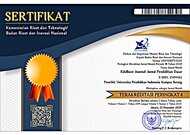Statistical Testing on Basic Science Practical on Students’ Performance in Ilorin-East LGA, Kwara State
Abstract
It is urgent to address a systematic and objective approach to evaluating students’ practical skills. Exceptionally, current subjective assessment methods for students’ practical performance are to be provided with a more objective evaluation. Hence the study investigated the statistical testing on Basic Science practical on students’ academic performance in students in Ilorin East, Kwara State, Nigeria. The study was a descriptive research survey type. 120 students were sampled in secondary schools in Ilorin East LGA using a purposive sampling technique. The researchers designed a questionnaire was used to accumulate information from respondents. Data collected were analyzed using percentage, mean, frequency count, independent t-test, and ANOVA at 0.05 alpha significance level. The findings revealed that Basic Science practical has a great influence on school students' academic performance and also on the level of understanding and retention capabilities of students but there was no significant influence on students’ academic performance based on gender as well as class size. Also, student’s academic performance in Basic Science was not significantly influenced by gender or class size partially. It is recommended that all Basic Science teachers should engage students more in practical activities than the theory aspect to facilitate better understanding among the students.
Keywords
Full Text:
PDFReferences
Abidoye, F., Adebisi, A. M., Rihanat, A. A., & Aliyu, M. Z. (2022). Availability of laboratory facilities on students’ performance in upper basic schools in Kwara State, Nigeria. International Journal of Educational Research Review, 7(4), 262–267.
Abidoye, F. O., & Adedeji, K. (2022). Impact of laboratory facilities access in Kwara State, Nigeria on student performance in upper basic schools. Jurnal Mangifera Edu, 7(2), 57–64.
Adolphus, T., & Godgift, P. (2022). Class size influence on teaching and learning of basic science in junior secondary schools in Port Harcourt Metropolis. Rivers State. University Journal of Education (RSUJOE), 25(1), 13–21.
Akinwumi, I. O., & Falemu, F. A. (2020). Effects of biology practicals on academic performance of secondary school students in biology in Ikere Local Government Area of Ekiti State, Nigeria. International Journal of Innovative Studies, 3(1), 1–11.
Altinok, N., & Kingdom, G. (2012). New evidence on class size effects: A pupil fixed effects approach. Oxford Bulletin of Economics & Statistics, 74(2), 203–229.
Amoo, O. (2019). Towards effective teaching and learning of integrated science at Upper Basic Schools Kara’ levels in Nigeria. Journal of Education Studies and Research, 6(1), 117–124.
Ayanwoye, O. K. (2016). Effects of class size and gender on students’ achievement in mathematics in Ogbomoso South Local Government Area of Oyo State. International Journal of Education and Evaluation, 2(5), 31–41.
Bello, T. O. (2014). Effect of gender on basic science practical skills of lower primary school pupils. Journal of Emerging Trends in Educational Research and Policy, 5(6), 679–683.
Buba, E., & Marcel, P. A. (2019). Effect of biology practical method of teaching on students’ academic achievement of senior secondary schools in Mubi Educational Zone, Adamawa State. Adamawa State University Journal of Scientific Research, 7(2), 197–204.
Eboatu, V. N., & Ehirim, J. U. (2018). Perceived effect of class size on academic achievement of junior secondary school students in Awka North Local Government Area of Anambra State, Nigeria. International Journal of Research and Innovation in Social Science (IJRISS), 2(7), 150–155.
Etiubon, R. U., & Udoh, N. M. (2017). Effects of practical activities and manual on science students’ academic performance on solubility in urban local education authority of Akwa Ibom State. Journal of Education and Practice, 8(3), 202–209.
Evans, O., & Rubin, M. (2022). On a class on their own: Investigating the role of social integration in the association between social class and mental well-being. Personality and Social Psychology Bulletin, 48(5), 690–703.
Gwamna, S. K., Jatau, A., & Ugwu, L. (2021). Effects of class size on performance and attitude in ecology among senior secondary students in Sabon-Tasha, Kaduna State, Nigeria. International Journal of Research in Education Humanities and Commerce, 2(2), 13–22.
Hinneh, J. T. (2017). Attitude towards Practical work and students’ achievement in biology: A case of a private senior secondary school in Gaborone, Botswana. IOSR Journal of Mathematics (IOSR-JM), 13(4), 6–11.
Ibe, E., & Abonyi, O. S. (2014). Effects of Exposure to constructivist instruction on interest of male and female science students. International Journal of Scientific & Engineering Research, 5(2), 1558–1561.
Nigerian Educational Research and Development Council (NERDC). (2007). Basic Science Curriculum for JS1-3. Nigeria: NERDC.
Nwafor, C. E., & Oka, O. O. (2016). Effects of computer assisted instruction on the achievement of junior secondary school students’ in basic science. International Journal of Scientific & Engineering Research, 7(10), 1940–1957.
Ogunleye, B. O., & Babajide, V. F. T. (2011). Commitment to science and gender as determinants of students achievement and practical skills in physics. Journal of the Science Teachers Association of Nigeria, 46 (1), 125–135.
Okam, C. C., & Zakari, I. I. (2017) Impact of laboratory-based teaching strategy on students’ attitudes and mastery of chemistry in Katsina Metropolis, Katsina State, Nigeria. International Journal of Innovative Research and Development, 6(1), 112–121.
Olurotimi, B. J., & Nike, A. O. (2021). Effects of class size on students’ attitude and academic performance in english language among secondary school students in Ado Local Government, Ekiti State. LLT Journal: A Journal on Language and Language Teaching, 24(1), 23–35.
Omwirhiren, E. M., & Anderson, F. E. (2018). Effect of class size and students’ attitude on academic performance in chemistry at demonstration secondary school, Ahmadu Bello University, Zaria, Nigeria. Journal of Research & Method in Education, 6(1), 1–6.
Rono, J. K., Begi, N., & Mwoma, T. (2022). Correlation between class size and pupils’ acquisition of early mathematics competencies: A case of Kericho County, Kenya. Journal of Education and Practice, 11(21), 212–222.
Rubin, M. (2012). Social class differences in social integration among students in higher education: A meta-analysis and recommendations for future research. Journal of Diversity in Higher Education, 5(1), 22–38.
Ruffina, A. N., Esther, A. E., & Anastecia, I. N. (2018). Impact of class size on students’ academic performance in Biology in Idemili North Local Government Area of Anambra State. International Journal of Education and Evaluation, 4(8), 22–32.
Schwichow, M., Zimmerman, C., Croker, S., & Härtig, H. (2016). What students learn from hands-on activities? Journal of Research in Science Teaching, 53(7), 980–1002.
Yusuf, T. A., Onifade, C A., & Bello, O. S. (2016). Impact of class size on learning, behavioral and general attitudes of students in secondary schools in Abeokuta, Ogun State Nigeria. Journal of Research Initiatives, 2(1), 1–19.
DOI: https://doi.org/10.17509/ebj.v6i1.64080
Refbacks
- There are currently no refbacks.
Copyright (c) 2024 Universitas Pendidikan Indonesia
This work is licensed under a Creative Commons Attribution 4.0 International License.
This journal is indexed by




.png)




.png)
1.png)


1.png)

.png)